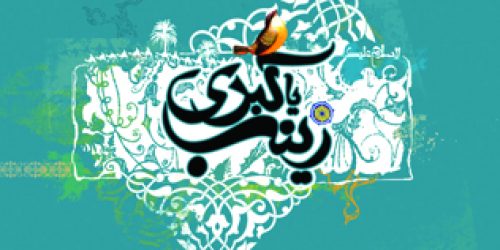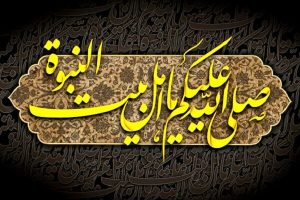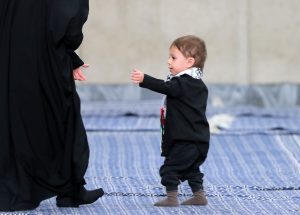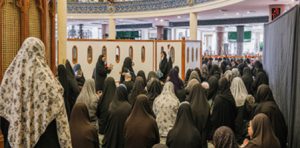Prepared by: the collectors of Professor Taha’i’s books
Translated by: I. M. Gonzalez
The life of the great lady of Islam Hazrat Zaynab (peace be upon her) taught not only females, but all freedom-loving people of the world. This (admirable) lady accompanied her honorable brother Hossain ibn Ali (peace be upon him), to lead the greatest uprising of humankind – an uprising that with all of its dominations is still not (fully) understood.
In 6 AH, Medina bore witnessed to the rising of an immaculate star that was born from Hazrat Zahra (peace be upon her). The Prophet of Islam (PBUH&F) was on a trip at that time and Hazrat Zahra and Ali (PBUH) did not select a name beforehand and so after his return they brought their child before the Messenger of Allah (PBUH&F).
Gabriel appeared and stated, “O, Messenger of Allah! Allah the most High, has stated that the name of this child is written on the Protected Tablet and her name is Zaynab.” (Rai’yaheen al-Sharie’eh, vol. 3, p. 37). Zaynab is formed from two words (zayn) and (ab); meaning adornment of her father.
The character of Hazrat Zaynab (PBUH)
From where and how do the foundation, basis, and character of a person begin to form? Generally, life depends on training and education. One of the most important principles of educating a child is training. Training has three ranks (family, society, and environment), wherein family environment and heredity play the most important role. Children who have lived in a family with good integrity and have been educated will develop into noble and devoted persons.
Zaynab (PBUH) was born in a family wherein divine training was central. The head of this family was the Holy Prophet of Islam (PBUH) and the implementers of her training were Hazrat Ali and Zahra (PBUH).
Zaynab (PBUH) grew-up in an environment of revelation, which in terms of training was very rich. It is evident that this kind of training had an extraordinary impact on her heavenly soul.
By taking a glance at the outstanding personalities who had a main role in the heavenly training of Hazrat Zaynab (PBUH), we can become more familiar with her existential dimensions. Her honorable father, Ali (PBUH) is the second (most important) figure in Islam and he is the successor of the Prophet (PBUH&F). With her father’s knowledge, courage, and piety, she is exemplar in two points (because of her parents). Her mother was raised in the lap of the distinguished Holy Prophet (PBUH&F), who, because of his great fondness and respect that he had for his daughter, would kiss her hand and rise before her (when she enter a room). In turn, Hazrat Zaynab’s (PBUH) mother was spoken to by the angles.
The grandmother of Hazrat Zaynab (PBUH) was Khadijeh (PBUH). She was an honorable lady whose husband was the Holy Prophet (PBUH&F) and she was his aider. Surely, heredity has contributed significantly to her character. Perhaps we can describe her by quoting from the verses of the Ziarat of Abdullah Hossain (PBUH), “O, honorable Lady! I witness that you were a light from an honorable and high ranking loin (meaning her father) and pure womb (meaning her mother), in which you were not polluted by any uncleanness.”
The role of Hazrat Zahra (PBUH) in her daughter’s worship and devotion was evident. Whatever has been recorded by history indicates that her devotion and worship was similar to her mother Lady Fatemeh al-Zahra (PBUH). Her worship was such that Imam Sajjad (PBUH) said, “During the journey from Medina to Karbala and from Kufeh and Sham (present-day Damascus) and until we returned to Medina, my paternal aunt never abandoned her midnight prayers. Hazrat Zaynab (PBUH) to this (great) extend give importance to mostahab prayers; on the eleventh of Muharram she sat alone and did her prayers.” (Rai’yaheen al-Sharie’eh, vol. 3, p. 2)
Imam Hossain (PBUH) in his last farewell to his sister said, “O, my sister! Do not forget me in your midnight prayers”. (Gha’emi, Ali, The life of Hazrat Zaynab (PBUH), p. 150)
The knowledge of Hazrat Zaynab (PBUH)
Knowledge and deeds are the two wings of flight for human beings. These two wings are of great significance for the nourishment of the human soul and to arrive at completion. When these two powers are more in an individual then virtue and glory are more.
During the time when Imam Ali (PBUH) was in Kufeh, the men of Kufeh delivered a message on behalf of their womenfolk to Imam Ali (PBUH) in which they requested a sitting with Hazrat Zaynab (PBUH) so as to benefit from her knowledge. Imam Ali (PBHU) gave his permission and Hazrat Zaynab (PBUH) organized Quran interpretation meetings. One day Imam Ali (PBUH) visited one of her meetings and saw that she was giving an interpretation on the first verse of chapter Maryam (Ka, Ha, Ya, Ain, Sad). Hazrat Ali (PBUH) said, “Dear Zaynab! These words and letters refer to the sufferings that will be imposed on the Prophet’s Ahul-Bait (PBUH), in which you will have a share in.” (Rai’yaheen al-Sharie’eh, vol. 3, p. 57).
Imam Sajad (PBUH) said, “O, Aunt! You are the praise-worthy of Allah; the knowledgeable without a teacher; you have understanding without anyone making you to understand.” (Rai’yaheen al-Sharie’eh, vol. 45, p.164)
The asceticism of Hazrat Zaynab (PBUH)
When Jafar (PBUH) became martyred, the Holy Prophet (PBUH&F) visited Abdullah ibn Jafar and prayed for him so that his business would prosper. From the Prophet’s (PBUH&F) supplication, Abdullah acquired great wealth and so he spent all of this wealth on the poor and needy, to such an extent that he became known as the Father of the Needy. Hazrat Zaynab (PBUH) had such a husband and they were very much devoted to each other. However, at the time of commencing their marriage, she placed a condition on her husband that she would not separate herself from her brother Imam Hossain (PBUH). When the events of Karbala took place, with her husband’s permission she accompanied her brother and she turned her back on all of her wealth and comforts; moreover, she took her two sons along and prepared them for martyrdom.
The patience of Hazrat Zaynab (PBUH)
The patience of any person is extremely dependent upon his/her conviction; meaning patience is a requirement of conviction. Since Hazrat Zaynab (PBUH), following in degree after the (fourteen) Infallibles, possessed the highest degree of conviction, her patience that she practiced from the noontime of Ashura until the end of her life was unparalleled. The holy Quran said, “Surely Allah is with the patient”. (2:153)
When Imam Hossain (PBUH) placed his hand on her and said, “My sister! Be patient.” She replied, “I will be so patient that patience will become exhausted.” The peak of her patience was when she saw the virtuous body of her brother and at that time she said, “O Allah! Accept this small sacrifice from us.” (Rai’yaheen al-Sharie’eh, vol. 45, passage 39, p. 117) She then said, “I have not seen anything from Allah except beauty!” These people, who went to their martyrdom, were a community that Allah, the most High, recorded for them martyrdom; they themselves went (willingly) towards their graves.
The devotion of Hazrat Zaynab (PBUH) to Imamat
Hazrat Zaynab (PBUH) during her childhood would accompany her mother to the mosque while she delivered her sermons. She would listen to her mother’s eloquent sermons defending Imamat and Hazrat Zaynab (PBUH) memorized these sermons word-for-word and so the sermons of Hazrat Zahra (PBUH) were recorded through her daughter’s recollections. (Rai’yaheen al-Sharie’eh, vol. 3, p. 51) Hence, this Zaynab (PBUH) accompanied her brother to Karbala and was consulted therewith. The day of Ashura until the afternoon, this honorable Lady with Imam Hossain (PBUH) took care of the bodies of the martyrs. They aided each other and brought the bodies to the tents. She listened to her Imam’s recommendations and advice and this allowed her, at the peak of suffering, to take responsibility for the 84 women and children who were held captive. After the martyrdom of her brother, she had to protect the new Imam, being Imam Sajjad (PBUH), so that nothing would happen to him.
If Hazrat Zaynab (PBUH) was not inline with her brother, then the events of Karbala would have been nothing but a mere strategy and would have been forgotten. Moreover, she in defense of Imamat delivered an eloquent sermon. This defense of Imamat continued until her last breath; even in Medina in front of those men who deserted Imamat. She was exceptionally stable and strong in front of tyranny and oppression and many enemies could not, even to the extend of a molecule, make her turn away from Imamat.
The courage of Hazrat Zaynab (PBUH)
Hazrat Zaynab (PBUH) with dignity, calmness, and pride moved the broken spears side and placed her hand under the body of her brother, and with a loud voice cried, “O, Messenger of Allah! This is your Hossain who has fallen to the ground and has become martyred.” (Rai’yaheen al-Sharie’eh, vol. 3, p. 109) Why did she shout with a loud and powerful voice? Since Hazrat Zaynab’s (PBUH) mission had begun. If Hazrat Zaynab (PBUH) did not follow up on the events of martyrdom and Karbala then this event would have been completely erased. It was said that, “Foreigners rose up against Yazid and he killed them! So it was over.” However, Hazrat Zaynab (PBUH) step-by-step had a mission in which she had to make the people understand the main principles of those events.
It has been written in history about the sermons of Hazrat Zaynab (PBUH) that friends and foes cried (when they heard her words). If Hazrat Zaynab (PBUH) had wept and wailed then she could not have influenced others. In Kufeh, ibn Zi’yad, in order to humiliate the Ahul-Bait (PBUT), said, “I thank Allah that you became disgraced and you have lost your reputation and you were killed and your lies have been revealed!” Hazrat Zaynab (PBUH) had to respond and so she could not show herself to be smote. Hence she replied, “Praise Allah, this dishonor belongs to the dishonest people and saying lies belong to the corrupt people and we are not apart of such people…Know that soon Allah will gather up you and those people.” (Bihar al-Anwar, vol. 45, passage 39, p. 115)
The modesty and chastity of Hazrat Zaynab (PBUH)
One of the lessons of Ashura was piety, chastity and purity. In this situation, the only issue that Hazrat Zaynab (PBUH) and the other ladies and even children were anxious about was to stand before strangers without proper hejab and so they requested that as much as was possible to take them into the city by the road that had the least people and or take the beheaded heads of the holy martyrs to the front (of the caravan) so that the onlookers would be preoccupied by that sight and so they would not look at the womenfolk. Hazrat Zaynab (PBUH) was prepared to sacrifice her sons and brother and become a captive; all the while she guarded her modesty and piety to the end. In the meeting they had with Yazid, she said, “You keep your women and female servants behind a curtain, but in the cities and desert you expose the womenfolk of the Ahul-Bait of the Messenger of Allah.” (Rai’yaheen al-Sharie’eh, p. 174) Hazrat Zaynab (PBUH) considered this factor as a sign of Yazid’s degradation and disgracefulness and criticized him (for these characteristics.) Mentioning these issues in Yazid’s court is an indication of how important the issue of hejab was for her.









